Sean Astin narrates the US version of this fascinating series - the video outcome of following a
meerkat "mob" (family, "gang") nicknamed the
"Whiskers" for several years - on the
Animal Planet network.
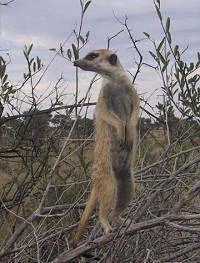 Meerkat Manor
Meerkat Manor hits just the right medium between
anthropomorphism and objective observation to captivate, entertain and educate us about the lifestyle and day to day life and death challenges of this intriguing group of
Kalahari Desert inhabitants, in their underground burrows as well as on terra firma.
The upbeat, light Disney-ish music that accompanies the programs is misleading, because when I say it takes us through all the family (functional and dysfunctional) issues as well as the challenge of surviving the formidable environment of the South African desert, I mean
all.
As cute as these 12-inch mammals might be, they experience everything we see on dramas starring human beings - and more. Small children might find it a little too intense and I'd suggest that kids in general see it in the company of an adult to further explain what they're watching.
Especially since we come to know each member of the family as he or she moves through the day fielding predators (including members of their own mob!), finding food, protecting their pups and of course "romance" -- but not everyone survives.
One production value I appreciate about Meerkat Manor is that unlike human participants who have been screened and "cast;" individuals craving exposure who can manipulate their personas in an attempt to be seen in a certain light by the audience or producers, or who can be manipulated by producers to do this or that in order to boost ratings in a "reality" show, these characters are not actors.
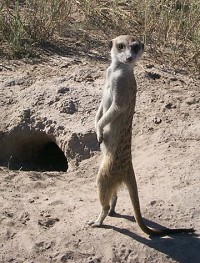
In fact, because they're animals they don't care about audiences or television; they've
absolutely unaware of fame, fortune, becoming "someone," religious groups who object to having pups out of wedlock, photo ops, parlaying this opportunity into a record or movie deal, trying to get a paw in the show biz door, yadda yadda yadda.
They just do what they do and have no idea that someone is watching them. No teeth whitening or veneers, "lifts," extensive workouts to take off that last ten pounds, publicists, agents or stylists.
Perhaps what is so enticing to us about watching these animals is that they often reflect our own image -- frequently walking on two legs, while still using all four limbs and their tail to get around and use as building tools.
So if the standard soap opera elements of hanky panky, feuds, reunions, rivalries, friends, enemies, danger, intrigue, neighbor problems, strong family values ( ;-), threats, victims, death, babies, literally climbing the food chain, heroes, failure and success among these engaging animals make for good television viewing in your home? I'd suggest you tune in.
Wikipedia has a complete breakdown of all the families, their members and personalities
here.
I find myself watching episodes more than once (or twice or three times, actually); hardcore fans buy the DVD's.
And there's more to come! The third season of 13 episodes is being completed for UK viewers - the rest of the world will catch up. And if the international popularity of this series continues, I believe we can count on more seasons after number three as well!
Labels: animal planet, anthropomorphism, documentary, family, feuds, Kalahari Desert, meerkat, Meerkat Manor, objective observation, soap opera, South Africa, survival, television, wikipedia
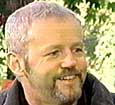 Yesterday I had the privilege of interviewing one of the best American actors today - David Morse - for my new movieScope Acting for the Camera column.
Yesterday I had the privilege of interviewing one of the best American actors today - David Morse - for my new movieScope Acting for the Camera column.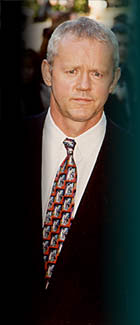
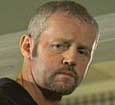

 In fact, because they're animals they don't care about audiences or television; they've absolutely unaware of fame, fortune, becoming "someone," religious groups who object to having pups out of wedlock, photo ops, parlaying this opportunity into a record or movie deal, trying to get a paw in the show biz door, yadda yadda yadda.
In fact, because they're animals they don't care about audiences or television; they've absolutely unaware of fame, fortune, becoming "someone," religious groups who object to having pups out of wedlock, photo ops, parlaying this opportunity into a record or movie deal, trying to get a paw in the show biz door, yadda yadda yadda.